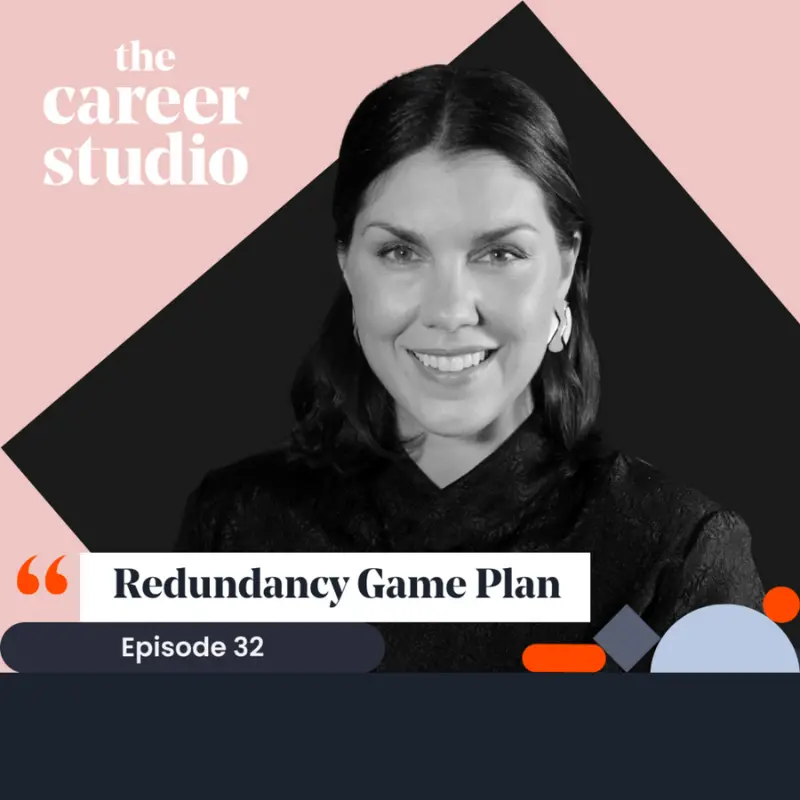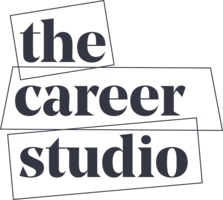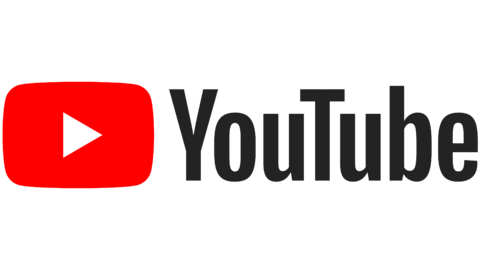Redundancy Game Plan

Redundancy is on everyone’s lips. Have you recently been made redundant? Is your company threatening redundancies? Are you considering leaving your job and restructuring your career? Then you’ll want to listen to this episode. In it I walk you through the typical mistakes I see people making post redundancy and how to use your time more effectively so you can create great opportunities that are right for you. We discuss applications, networking, feeling stressed, your mental health, and getting the right support. Like everything, when you know what to focus on you can make decisions that are right for you, faster.
Are you ready to create an energizing career you love?
You can create a career that is simply an extension of who you are and how you want to live your life. If this sounds like what you’re after then schedule a consultation. We'll get to the bottom of what's going on for you. And exactly where you need to focus to bring your career and life into alignment. It's free!
For more from The Career Studio
Transcript
Welcome to the career studio podcast, where we boil down the noise and focus on the core concepts, essential for building an energizing career you love. One that is simply an extension of who you are and how you wanna live your life. Anyone can do it. It's just a matter of knowing what to focus on.
Hi, guys. It is snowing in New York, which is really nice actually. I am enjoying the excuse to hibernate at home, work on some personal projects, work on some projects for the career studio, and just rest and watch some good films. I just saw Poor Things actually in the theater, and that is incredible.
Really, Incredibly done. The writing, the directing, the shots, the costumes, the set design, everything was so impeccable. Emma Stone is so good. So, if you want a great film, I really recommend seeing it.
I'm recording this in the middle of January. And okay, I hope wherever you are that you are taking care of yourself and doing well.
So what I wanted to talk to you about today is what to do if you get made redundant. I have been running a lot of consultations for my business. It's that time of year. I have a bunch of spots open. And so I've been talking to a lot of people over the past few weeks and at the end of last year, too. And so inevitably, I have spoken to a bunch of people who have been made redundant because as we know, the past year or so, there's been a whole slew of redundancies and they continue to happen.
So it's kind of a really common thing I'm coming across. And what I have heard through the consultations I've had is just where people are at and how people are navigating trying to find a job after being made redundant, and it's just really made it clear to me what are some of the slip ups and pitfalls that people can fall into, which means that they're using their time post redundancy ineffectively. And kind of ending up in a spot that they don't want to be in.
So, I thought I'd come on and do an episode about how to really be efficient and effective in using your time and exploring what comes next if and when you get made redundant. Okay, so that you can avoid some of the mistakes I am seeing. So yeah, if you have been made redundant, if you're in between jobs, if redundancy is maybe a potential on the horizon for your business, or, you know, if you're just generally thinking about switching up your career in some capacity, this podcast is for you.
I'm obviously talking about redundancy, but all of this stuff is common themes around taking that next step in your career and designing that in a way that's authentic and energizing. So I am going to dive into the typical mistakes I see people making, and then I will lay out how you should do it instead.
And that'll be the episode. Okay. So diving right in. The first mistake that I see people make is going straight to applications. Okay. And it's, it's very normal. Actually, let me, let me pause that and say a lot of people, when you get made redundant, the first thing is actually to take some time to rest.
And I always recommend that. I see a lot of people they're like, I took the first month to rest. I took the first few weeks to rest. I really recommend doing that to just reset and connect to yourself. It's always a good idea to spend a few weeks resting, but then don't go straight to applications. When you start to do this work, the first port of call should not be applications.
Okay. Unless, you know exactly what you want to do next and how you're positioned and that you have the right experience and you know the people that you want to talk to who can help you and you have your list of targets. Okay. Then you're in a position to really start applying or creating opportunities for yourself.
But for the most part, I find that people do not have this level of clarity. Getting made redundant often prompts, what am I doing with my career? Am I on the right path? You know, do I want to adjust things? More often than not, I meet people who are, yeah, thinking through stuff in a, in a broader way. So when you go straight to applications, you're going like 12 steps ahead of in the process.
There's a whole host of reflection and actions that you need to take in order to really be as strong and as sharp as possible for interviewing with companies that you might want to work at. Okay. So, you know, often what I'll see is people are kind of parallel tracking a few different ideas at the same time, which is in general, a big….., it's a heavy lift, right?
You have different positioning. You have different CVs. It's like three different jobs instead of one job. And it's better to really take your time and figure out what is that direction? How am I positioned? Do I have the right experience? Like, what do I need to do to get the right experience? Who are the right people to talk to?
What are the relationships I want to build? What are some ideas I have of how I can create impact? All of that is really important for you to be super, super clear on before you start an interview process, before you start applying to roles. Okay, so if you do not have the level of clarity I just laid out, do not start with applications.
It can be very tempting because it feels like we're making progress. It feels like, you know, it's very much in our control to review LinkedIn and, and submit a bunch of applications, but ultimately it's really ineffective and inefficient. Don't start with applications.
The second mistake I see people making is not talking to people or not having enough conversations.And this kind of shows up in two ways. Either people are not using their network at all. They're not having any applications. They're just applying to stuff blind on LinkedIn, which not only are you not ready for that, it's an extremely inefficient use of your time because only 2 percent of applications to jobs posted online are read by human eyes.
Okay. Most jobs are filled through referrals. You want to have contacts at the places you're interested in working so that you can get referrals. I mean, there's lots of other ways to create jobs and this is by far not the only way, but if you're not talking to people at all, that's a huge, huge mess. And at the very least, you should be having a referral.
But the second mistake I see here is kind of, Oh, people know they need a referral. People know that that's good, but actually just using your network to get referrals is not an efficient use of your network. It's a very transactional approach to the relationships in your life. Just to reach out to someone that maybe you haven't talked to in ages or that you don't know at all and ask them if they can refer you to something.
It's just very transactional and you miss out on an opportunity to really build a relationship to gain a whole host of information that would help you with your application and yeah, to perhaps create a mentor or a champion in your life that you can continue to work with and get support from. So, yes, if you are not talking to people and if you're only talking to people to ask for referrals, then you are not using your network efficiently. Okay. And I'll, I'm going to talk about how to fix all of this in a second.
So the third mistake I see people make is rushing. Really putting pressure on themselves, really putting a strong sense of urgency on themselves to figure out the next thing and get the job as quickly as possible. Sometimes this comes from financial pressure. Sometimes this comes from pressure to have your CV or career path look a certain way. Maybe you have judgment about having a gap on your CV. But the thing is, when we rush this process. We do not give ourselves the chance to explore and build the relationships we need to really make an aligned and energizing next step.
Okay. We end up just taking the first thing that fits the bill, or it doesn't even fit the bill. Just the first thing that we get and more likely than not, that's not going to be a considered next step and you're going to end up in an environment that's really not a good fit for you. Okay.
I have done this.I was made redundant from kind of a failing startup and I joined another startup and it was probably the most toxic 6 months of my life. Okay, and it's because I was rushing to sort it out. So don't rush. And I'll just say here as well that to give you a sense of timing, I normally say to people that if you know exactly what you want and how you're positioned and you have a good network, I like to allot three months to finding a job.
But if you're not exactly sure what you want, if you have some work to do on figuring out how to position yourself, um, if you're not sure how to create opportunities instead of just applying to opportunities, all of this is going to take you longer than three months. So giving you that time horizon so that you can have a sense of how much you really need to allot for yourself.
With my clients, I work with them for five months. And that allows us to have some time to really explore, figure out what direction they're going to before we start to really hone in on where they're going and pitching themselves for opportunities and creating those opportunities for themselves. Okay.So that gives you a sense of the timeline. Don't rush. You need to be able to create calm where you are so that you can chill out and do the work you need. And this kind of leads into the next point. The fourth mistake I see people making is really not addressing their mental health. So getting made redundant can knock your confidence.Right.
It's not a comfortable place to be. And if you're feeling low, if you're feeling insecure, either about the fact that you may have got made redundant or your ability to find a new job, or, you know, you're feeling uncertain about some of the ideas that you have, if you don't get the support for your mental health, it's going to impact how you approach the process.
Okay, it's going to impact how you're managing the process, right? It's going to impact how you're presenting yourself. It's going to impact what you even explore. So making sure that your mental health is really supporting you to do this work is essential. I mean, for me and my business. If for regular listeners to this podcast, they know that mindset is a fundamental pillar of my business, right?
It's one of the four pillars of creating an energizing career that you love. That's because you can't do the tactical work without doing the mental and emotional work. Okay? So really, you have to get that support alongside the tactical. Otherwise, you're just going to keep repeating the uninvestigated, unhelpful patterns that are going on in your brain, and we all have them.We all have limiting beliefs. We all have unhelpful patterns that, you know, get us into trouble or don't help us do exactly what we want.
So if you're not getting your mental health support, you're going to end up recreating that and not performing at your best. Okay. And then the last big mistake I see is not getting support.I can't even tell you how many people I have talked to over the past few weeks who are meeting me maybe six, seven, eight months after getting made redundant. And they spent that time trying to do stuff themselves. And I get that because we have this culture of assuming that we should just know how to do this.
You know, this isn't taught in school. So for some reason, people just assume that everyone should know how to do it. But that's not true. If you don't feel confident about what you're doing, if you're not sure where you're going, you need support to do this efficiently, right? Remember, right after you get redundant, you probably have a redundancy package and you have cash to invest in yourself.
And that way you can make those first six months after getting made redundant as productive as possible. To use them to land a job that really is a good fit for you within a timeframe that's also good for your bank account and your mental health. As I was saying earlier, without external support, you will Continue to create the results you have created in your career so far, right?
Because when we do everything ourselves, we are limited to our brain, our frame of reference, the way we have always done stuff. And if you want to do things differently, if you want to create different results than you have before, you are going to have to get help. So I really, really encourage you to, as soon as you get made redundant, start investigating what would be the right support for you.
And engage that support. Getting support for yourself is how you accelerate change. If there's this whole culture in our society of doing everything yourself, it is so inefficient. And if you really listen to anyone who's been wildly successful in their life, they will talk about how they got help from the people around them. So unless you know exactly what you're doing, which I would doubt because you're listening to this podcast, figure out where your weak spots are and get support for them. Okay. You don't have to do this alone. It'll be much more efficient if you get the right support. Okay.I'll come back to that. I could bang on about that forever. Of course, I'm a coach, so I'm about support, but that's the truth. Okay.
So those are my five mistakes I have been seeing that people make. So now let me walk you through from a top level perspective, really how you want to approach this process instead. And I kind of touched on this earlier, but I'm just going to go into a bit more detail. So at the beginning, you really need to take the time to first clarify what is the right direction for you. What is a really good fit for who you are and how you add value and what your priorities are. Okay. Take the time to think through and narrow down a precise direction of role, industry, target companies, right kind of culture, and get clear on how you are positioned for all of that stuff, right? And get clear on how you should talk about yourself, right?
With my clients, we have a whole in depth process for how to do this. We run through your strengths, your interests, your priorities. We put it all together in your North star that allows you to generate a whole host of hypotheses about what would be a good fit for you so that you have structure in the way that you are exploring what comes next. All of that work gives you language to talk about yourself so you know when you're networking, what you need to be asking, what you need to be highlighting in interviews, what you need to be asking interviewers about their company.
Remember you're interviewing them just as much as they are interviewing you. Okay. So you really need to first be super clear on your direction and how you're positioned. Okay. And two, in order to do that, you are have to going to do a lot, did I say that right? You are have to going to do, you are going to have to do a lot of informational networking conversations in a really structured and strategic way.
By doing networking in a structured and strategic way, this is going to give you the clarity you need on your direction. You're going to have an understanding of how to position yourself. You're going to be building relationships with people who can help you now and in the future. You're going to have relationships that you can use to land a job or create career opportunities.
So you need to make sure that you're using your network in a real relationship way, not a tactical way or not. Not at all. Right. So with my clients, we create a very structured approach to this process so that the conversations you are having are effective at getting you the information you need to make decisions and address your questions, your concerns, and fears.
A lot of times people end up just like having a nice chat with people and it's like, what did I actually learn? How is that actually helping me move the ball forward in this process? I had a client, she was working and she'd probably been looking for a job for about a year. Um, really with no success and you know, she'd gone straight to kind of interviewing and what we realized, I had her obviously do the whole process in a structured way and when she started having conversations, she realized that her current job and the skills that she has been building was much more valuable than she'd realized.
And actually what she had been doing in the year before I started working with her was like downplaying her current job and talking about experience that she'd had maybe like a decade ago because she was most proud of that. And she wasn't proud of her current experience, but because she was just stuck in her own head with her own judgments.
And she hadn't been asking the right questions of her network to really understand how she was positioned, the roles that were. Interesting to her and how her current experience set her up for that. And so by having really structured and strategic conversations, she was able to see, Oh, wait, I have all this amazing experience.That's super relevant that people really value. And that came from having the right conversations. I hope I said that in a clear way, but I wanted to mention her.
The next thing that you want to make sure that you're doing is instead of just applying to jobs online, you want to be creating opportunities to pitch businesses on how you can help them. Just waiting for applications to appear. It's fine. It doesn't mean you shouldn't do that and you should be building relationships with companies you think are interesting. And, and you know, if then they have a job description that comes open, then you can apply, but it's a very passive approach to your career.
And it makes you feel like you just have to take what's available. But if you learn how to approach businesses that you are interested in and you learn how to Pitch to them what you think they need and why you are well positioned to do that. You start to create opportunities for yourself, right? And even if that doesn't convert immediately, they're more likely to think about you as they're developing their business.
Okay. But this is really how many of my clients create opportunities for themselves by pitching stuff instead of passively waiting. Okay. And this obviously requires you to understand who you are, what you want, how you're positioned, how you can help, who you want to target. And it requires you to build genuine relationships with people who are in your space so that you can have kind of nerdy, geeky conversations about the work stuff that you guys are both interested in and then turn that into a proposal.
So they can really see how you think and, and see where there could be an opportunity. Okay. And so this puts you on the front foot and makes you feel a lot more in control of your destiny rather than on the back foot, waiting for someone to, um, present something that might work for you. So the fourth thing. As I said earlier, you really want to address your mental health. Okay. You want to create a calm and grounded energy with the process so that you don't. As I said, rush and grab the first thing that is available. Work on your belief in yourself, your belief in your previous experience, talk to people so you understand how you're positioned, you know, rest, take care of your body.
All of this will help your mental health. You want to make sure that you are feeling energized, you're feeling focused, you're feeling motivated, you believe in yourself, you're proud, you're feeling proud of your career experience and what you have to offer. You're feeling curious. You want to actively create those emotions.
And if you're not feeling those emotions on a daily basis as part of this process, then you are not going to be showing up as the best version of yourself. So you want to be focused on things. That creates the emotions that are going to support you to take the actions you need to take. Okay. That's a big part of my work with my clients.
Cultivating beliefs that create focus, self confidence, self worth, motivation, energy, curiosity. These are really lovely emotions that really support you in the process. So think about ways that you can create them for yourself. And lastly, just get the fucking support. As I said, I mean, I'm going to talk about this again, but there's so many structures available.
Okay. Choose the one that's right for you, but make sure that you are getting the right help for you from the beginning. Okay. Investing in yourself with a program that's right for you is how you accelerate change. Okay. Don't assume that you can do it alone. And remember, you can always make up for spent money, but you can't make up for spent time.
Right? Time is our most valuable resource. So yes, sometimes it feels uncomfortable to invest in yourself, but think about the flip side. If you don't invest in yourself and then six months later you're no closer or you still haven't created the results that you want, then which one is more uncomfortable?
Sometimes we get so focused on the discomfort of doing the new thing. That we haven't done before that we forget about the discomfort of where we are. As I said, I've seen so many people come through who wish they had spent the money on themselves immediately when they had the redundancy package so that they could by this time be making money instead of having spent their money and not have a lot to show for it because they've just been limited to their own frame of reference and the way that they have been operating.
With that, hopefully this has laid out some key things to focus on. And if you're listening to this, it's likely because you're considering what comes next. Maybe you've been made redundant. You might feel lost in some capacity. You need some support of some kind. And if what I explained and how I'm talking feels like the kind of support that you might want, right, then schedule a consultation.
Okay, really focusing on this. My program is five months. This is what I work on with all of my clients. And at the end of that, they are clear on where they're going and they're in momentum to make it happen. They've created multiple opportunities for themselves to pitch and sell themselves in a way that feels that they're really proud of.
And knowing that, then you have a map. You know, I had a former client reach out to me recently who got made redundant and she'd worked with me a couple of years ago. And she said, you know, and I'm, I'm so grateful for our work because even though I've been made redundant, I feel really calm. I know exactly what I need to do.
I have the playbook from our work together. And so I'm just going out and doing that. Her nervous system is rested and she can really focus on figuring out what's right for her next. Okay. But as I said, once you connect to yourself and know yourself and know how to navigate this process, both tactically, mentally, and emotionally, you have the tools.
And you will always have those tools and that will allow you to move from strength to strength as efficiently as possible in your career. So, whether it's with me or someone else, get yourself some help. Okay. Review what I've laid out in this episode, see where you stack up and use that to figure out what kind of support would be useful for you.
No one teaches us this stuff in school. So don't expect that you're going to know how to do this. Really. I find almost no one knows how to do what I've laid out. Okay. Even those people that you look at in your life and think that they have it all figured out. I promise you. Oftentimes those people are my clients.
People who move from strength to strength in their career are doing the things I've laid out above. Okay. And I guarantee that almost in every case they've had someone teach them how to do that. And this is why I've built this business to help more people understand what to do to build an energizing career that they love.
Have a great week.
Hey, if you're ready to create an energizing career you love, one that is simply an extension of who you are and how you want to live your life. Then I wanna invite you to schedule a consultation. We'll get to the bottom of what's going on for you. And exactly where you need to focus to bring your career and life into alignment. It's free. Just head on over to thecareer.studio/schedule to find a time that works for you, or if you're enjoying and getting value from these episodes, I'd love you to leave a short review on whatever podcast app you use.
This helps other people like you find and get value from the podcast too



